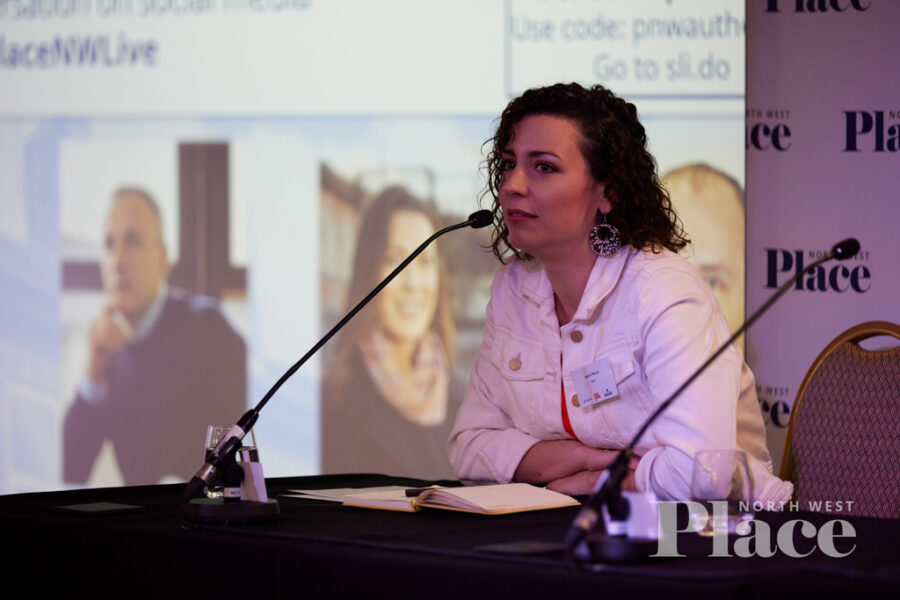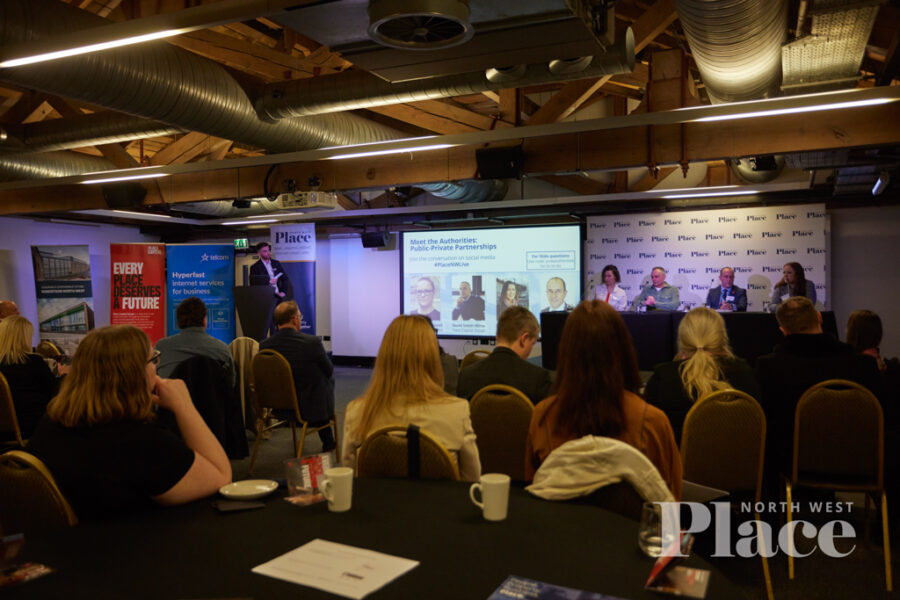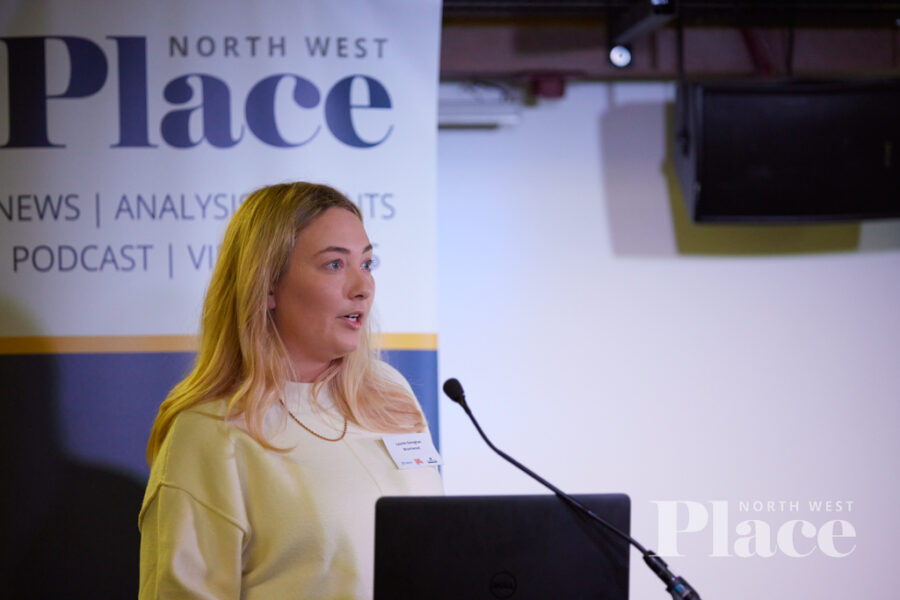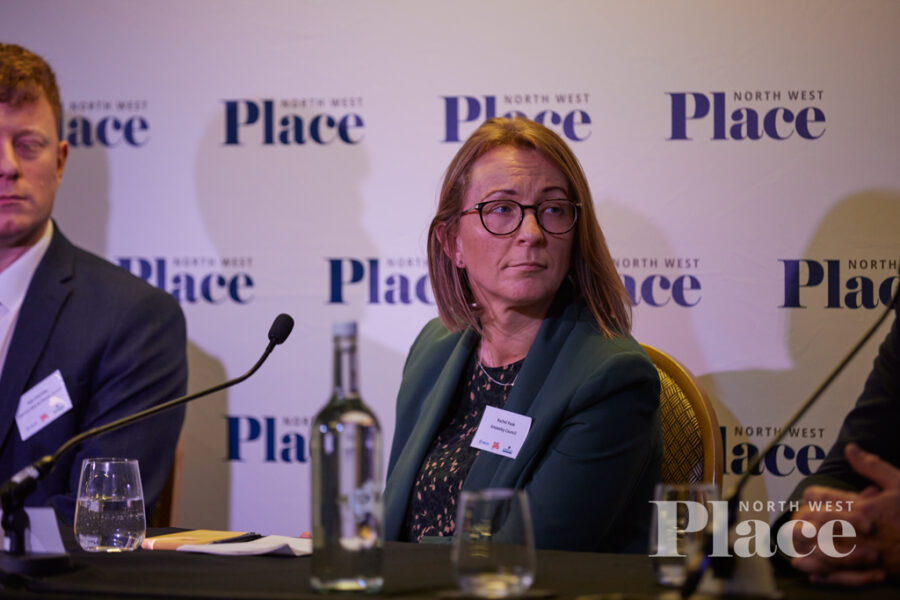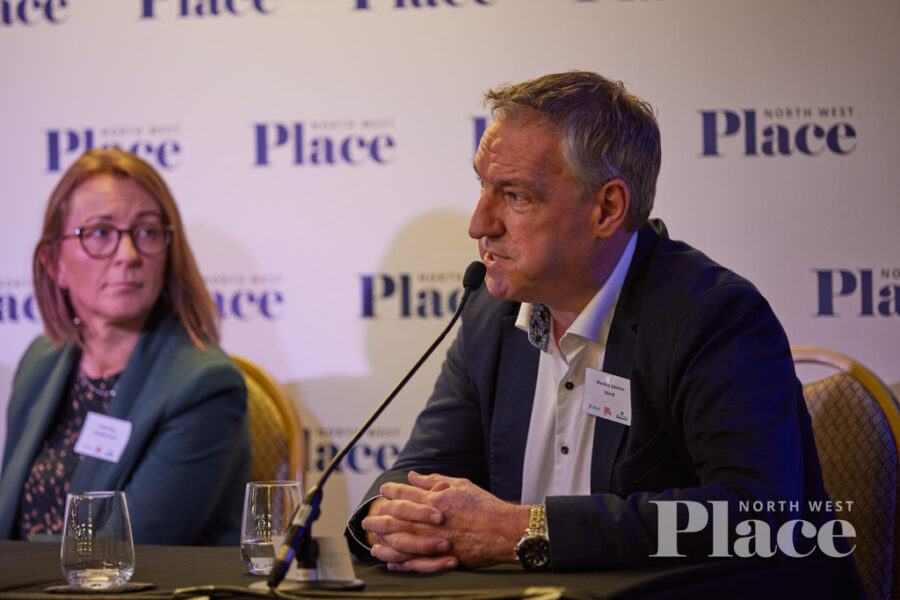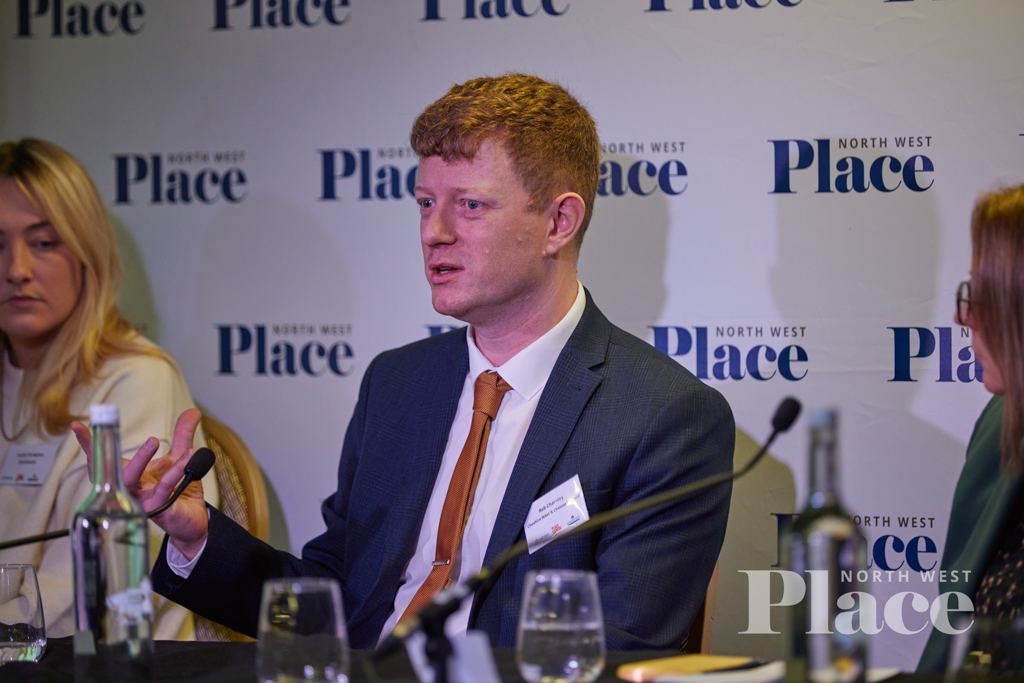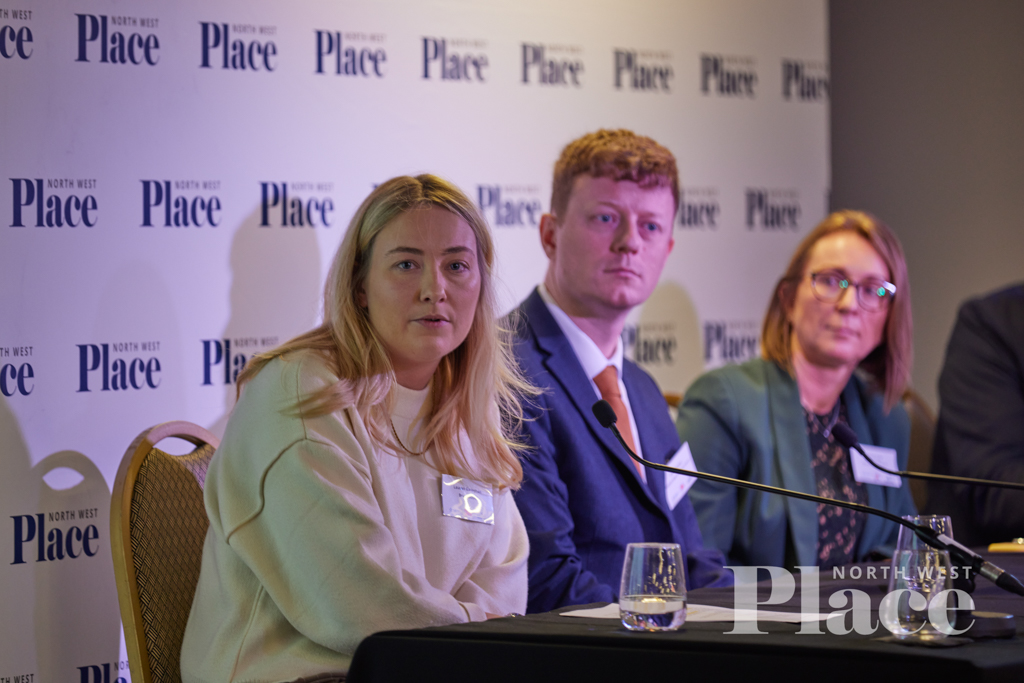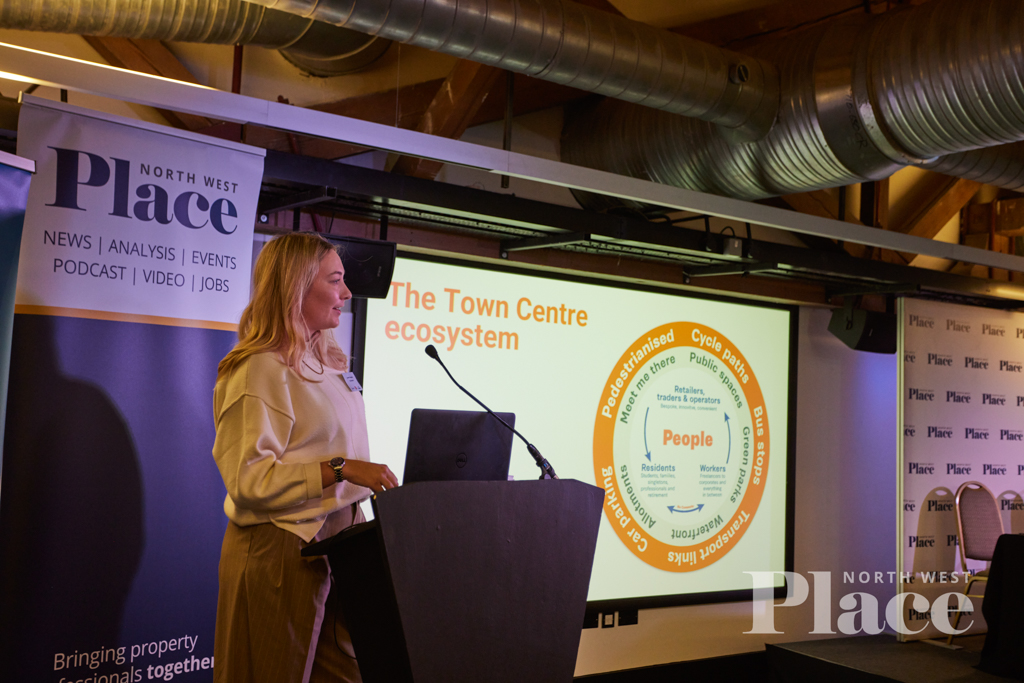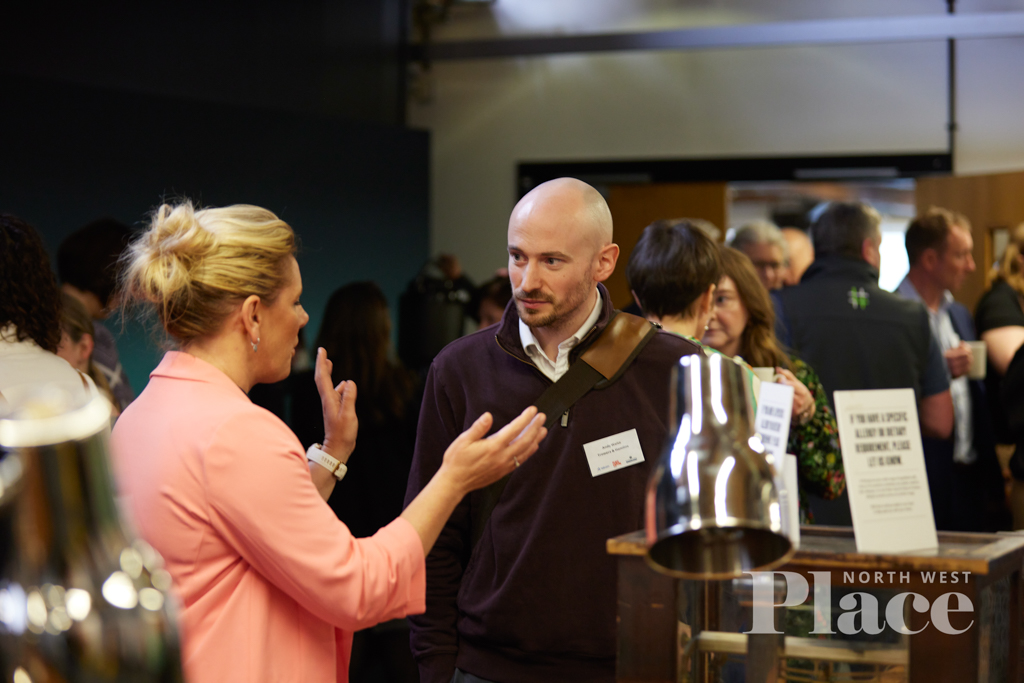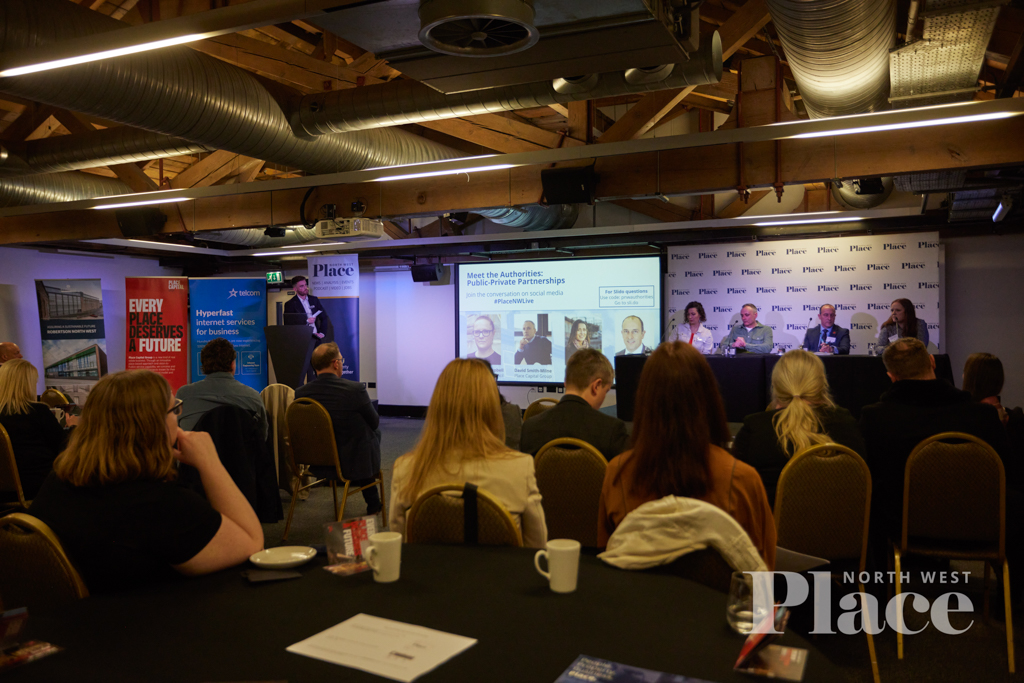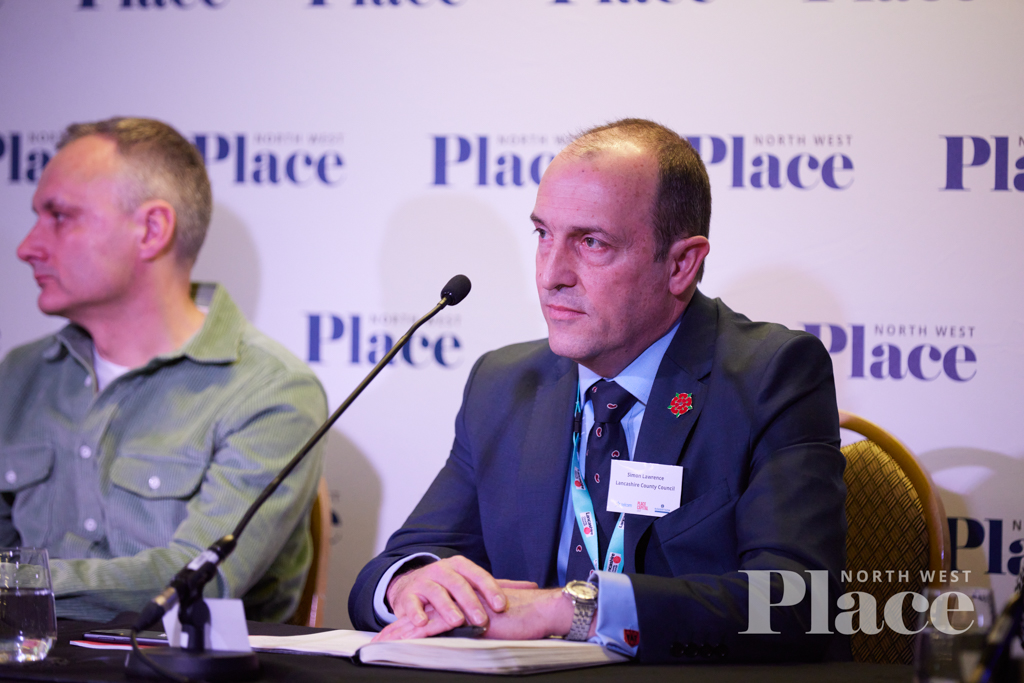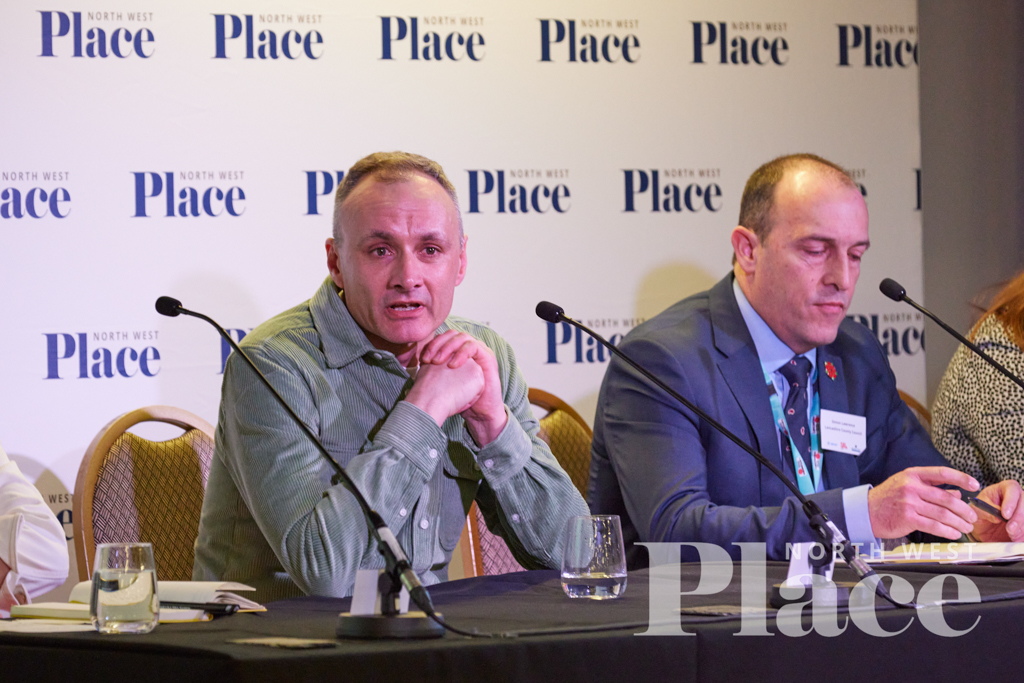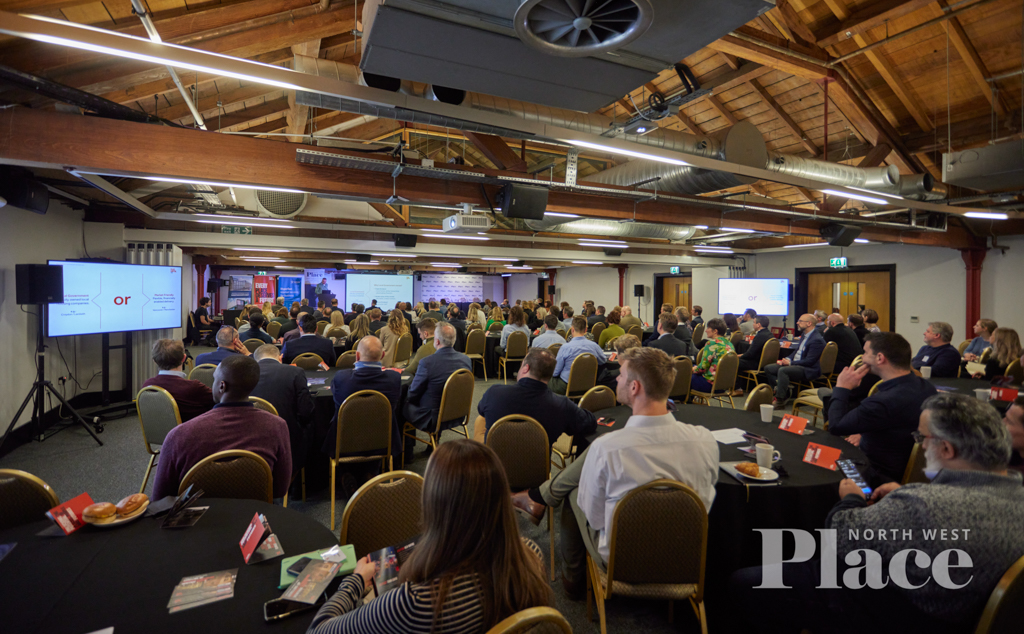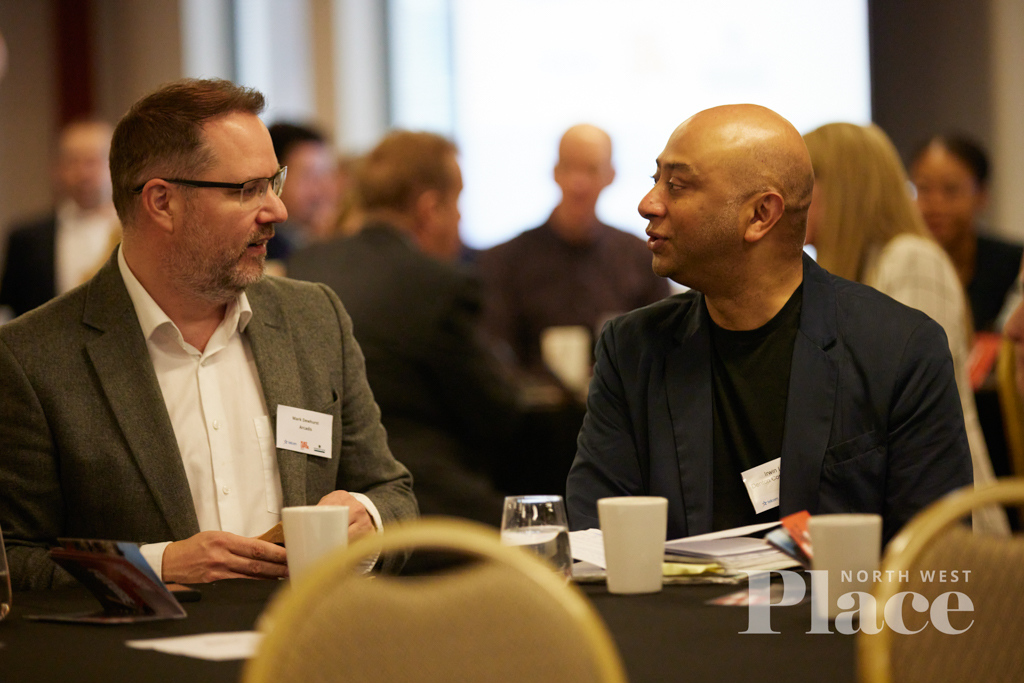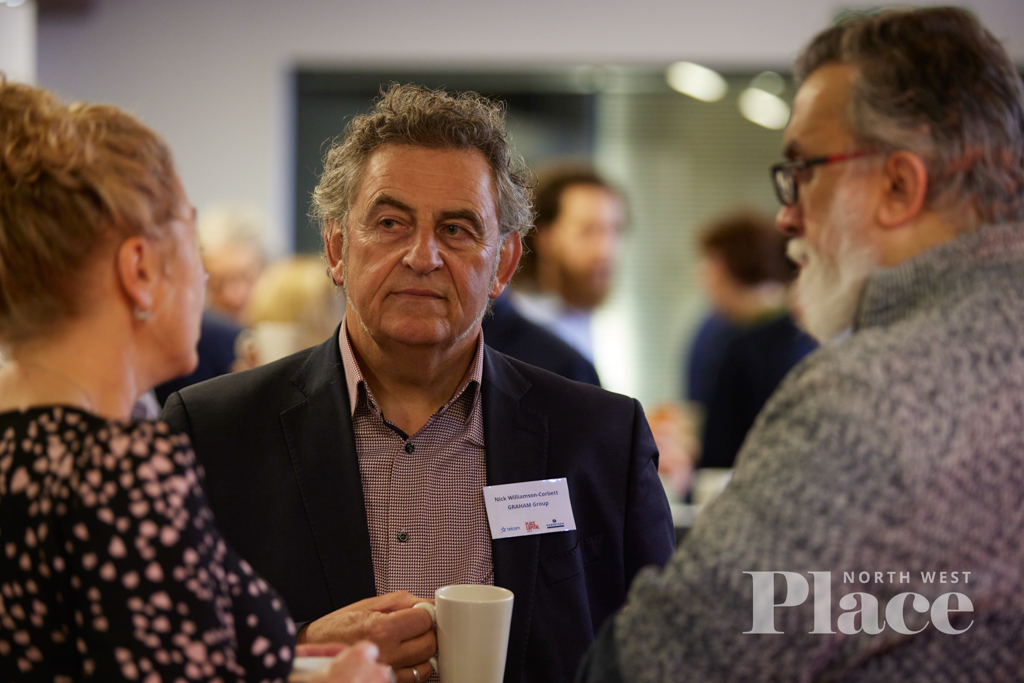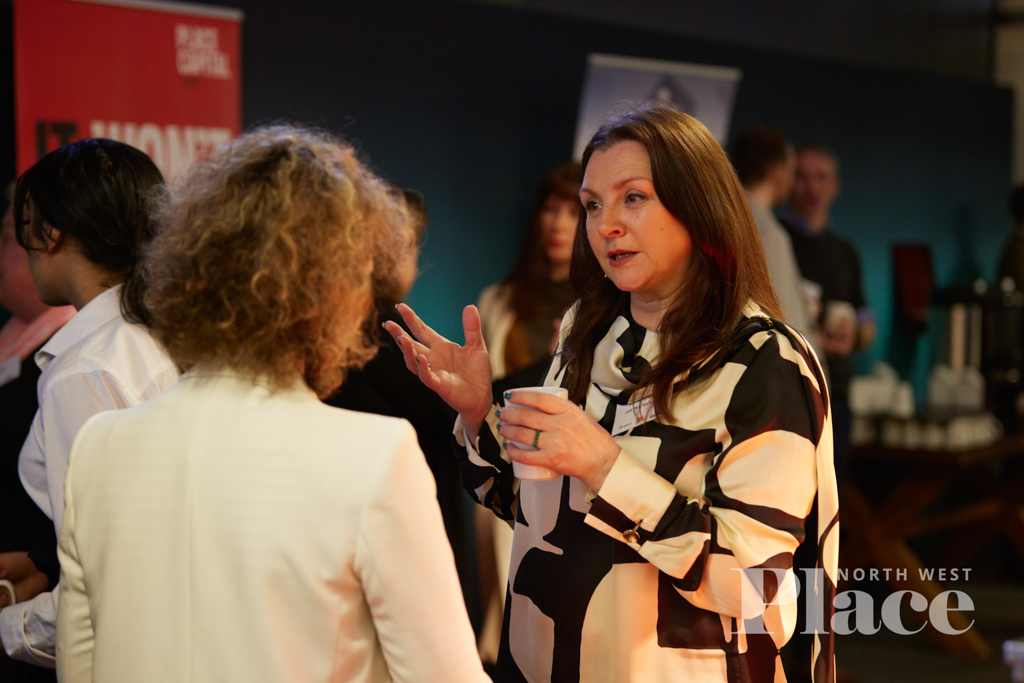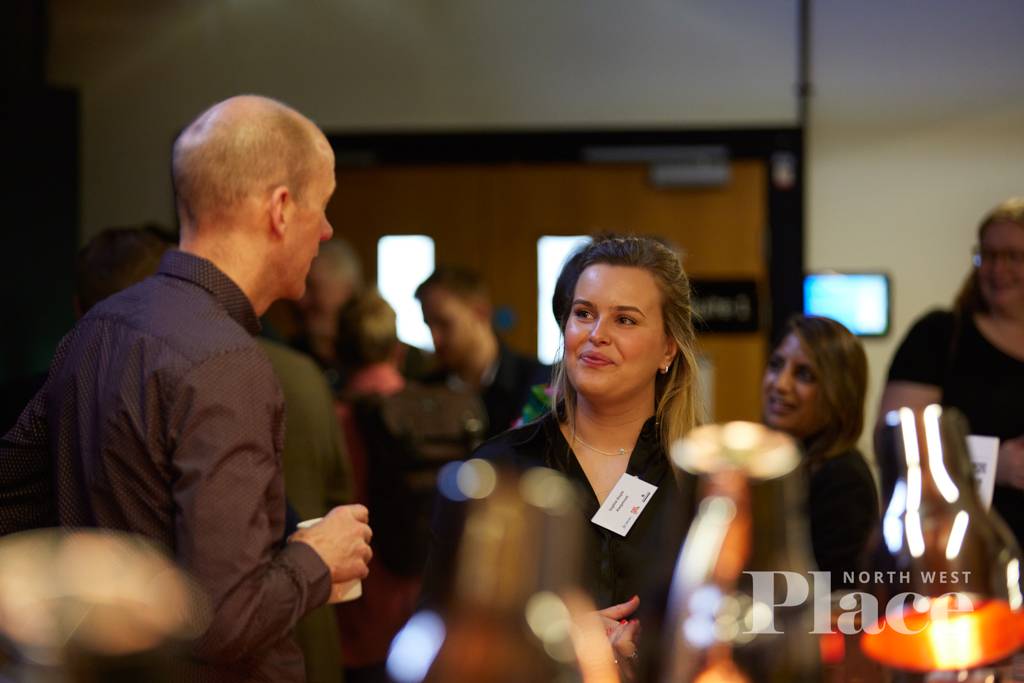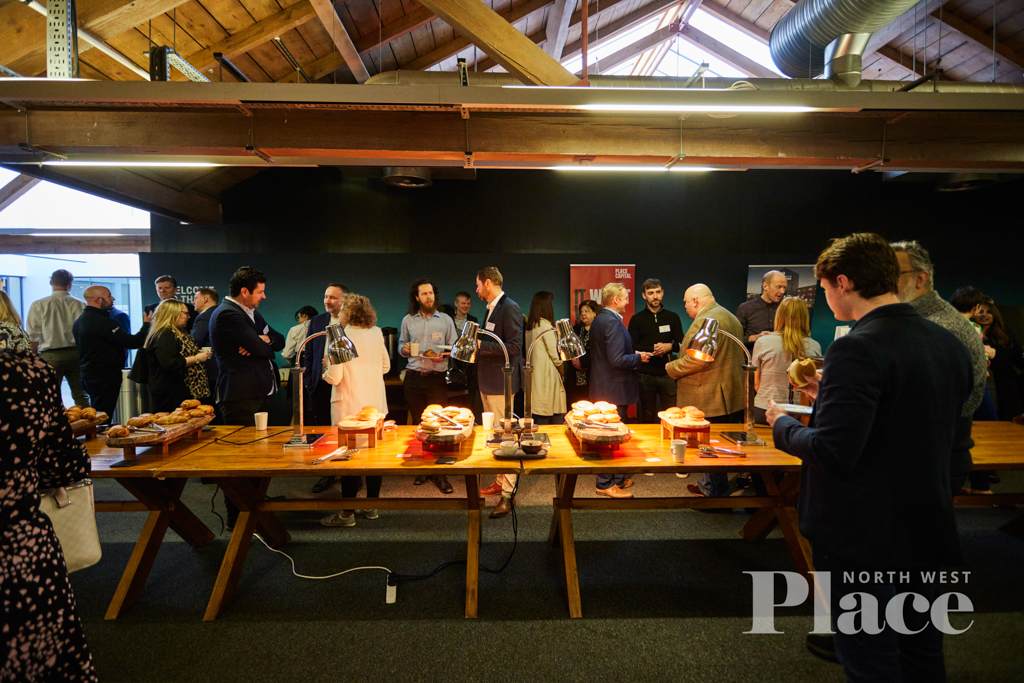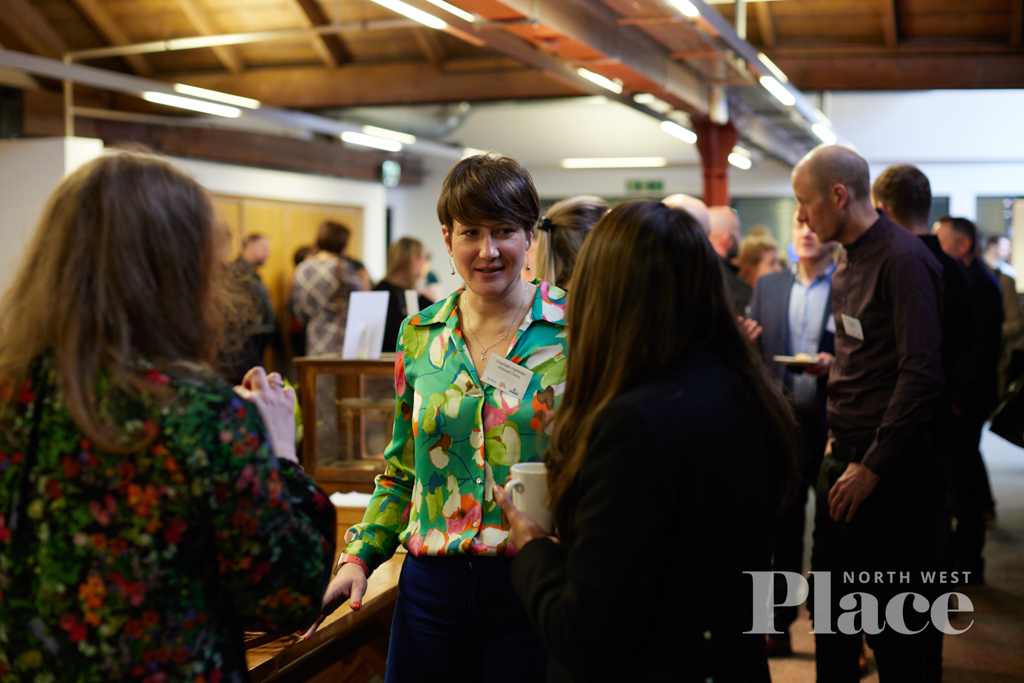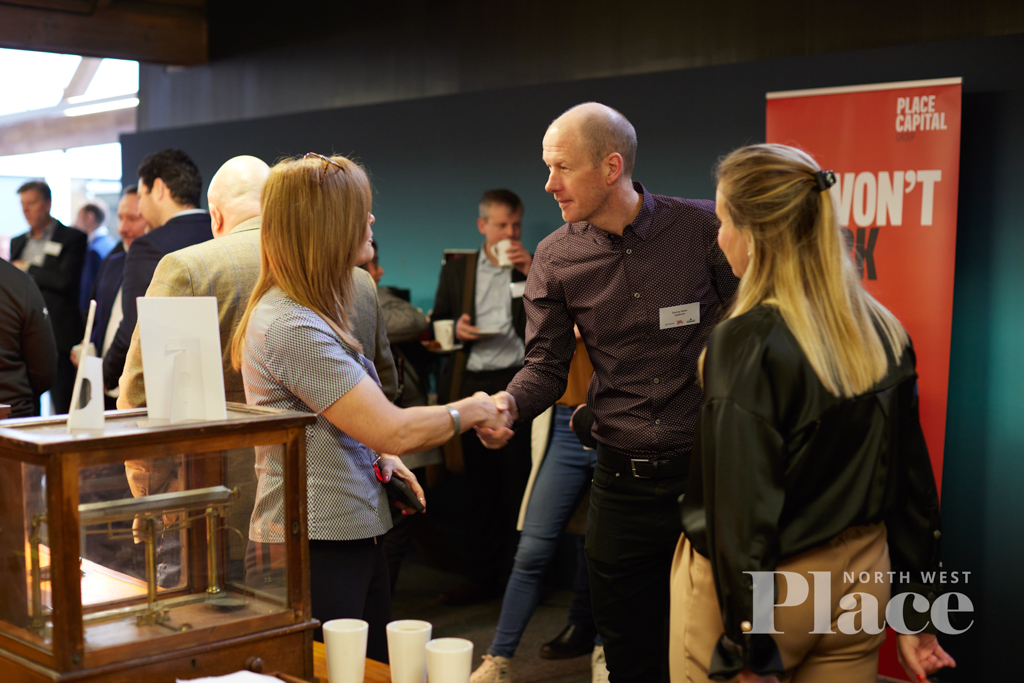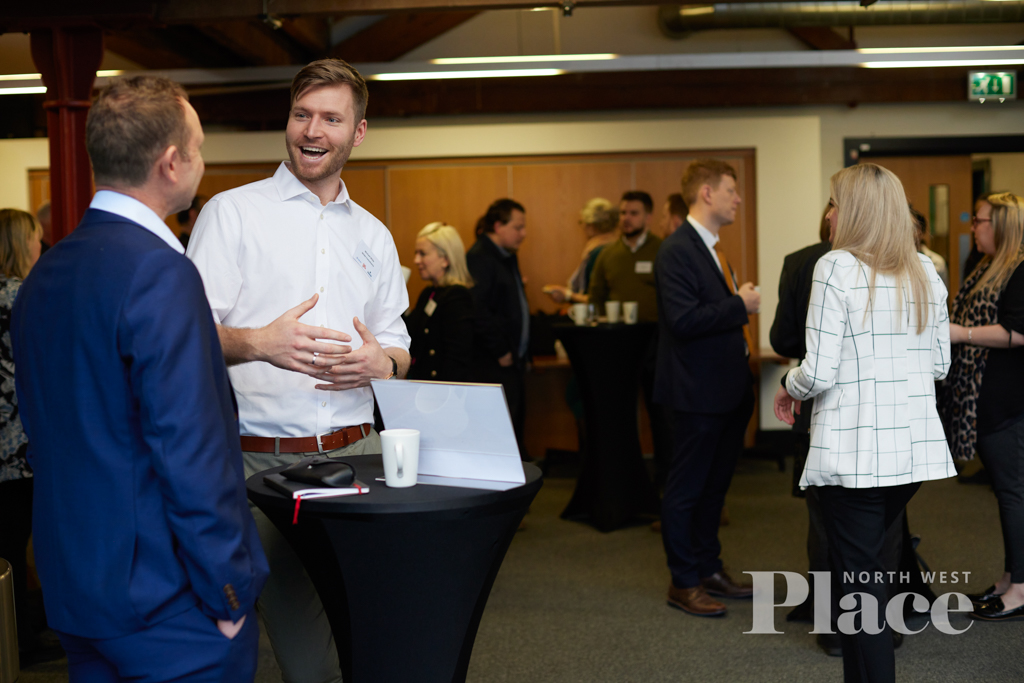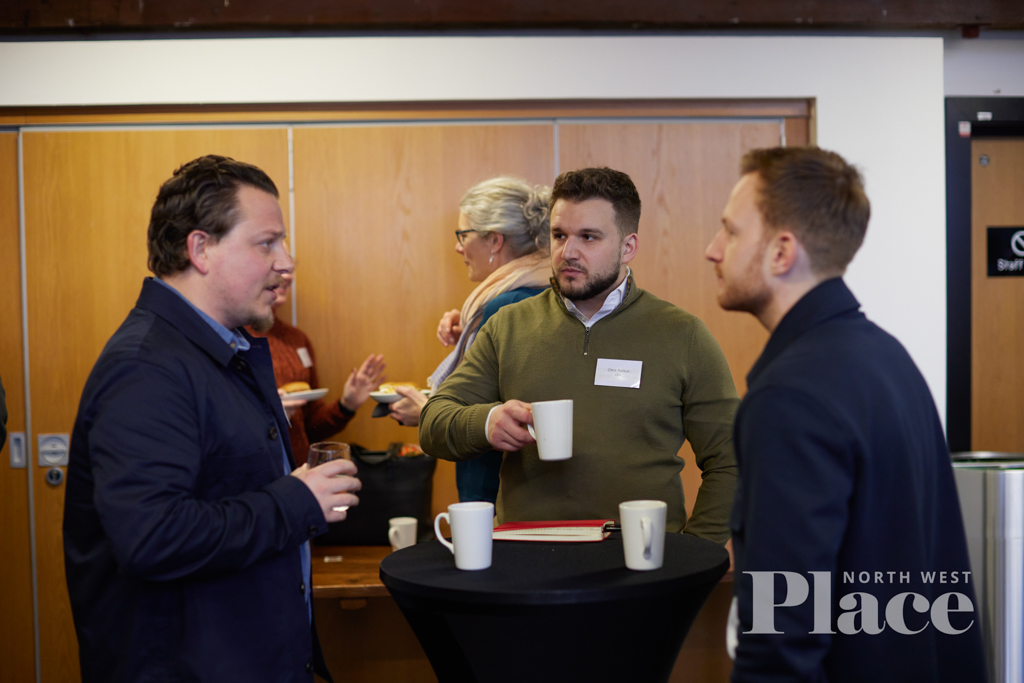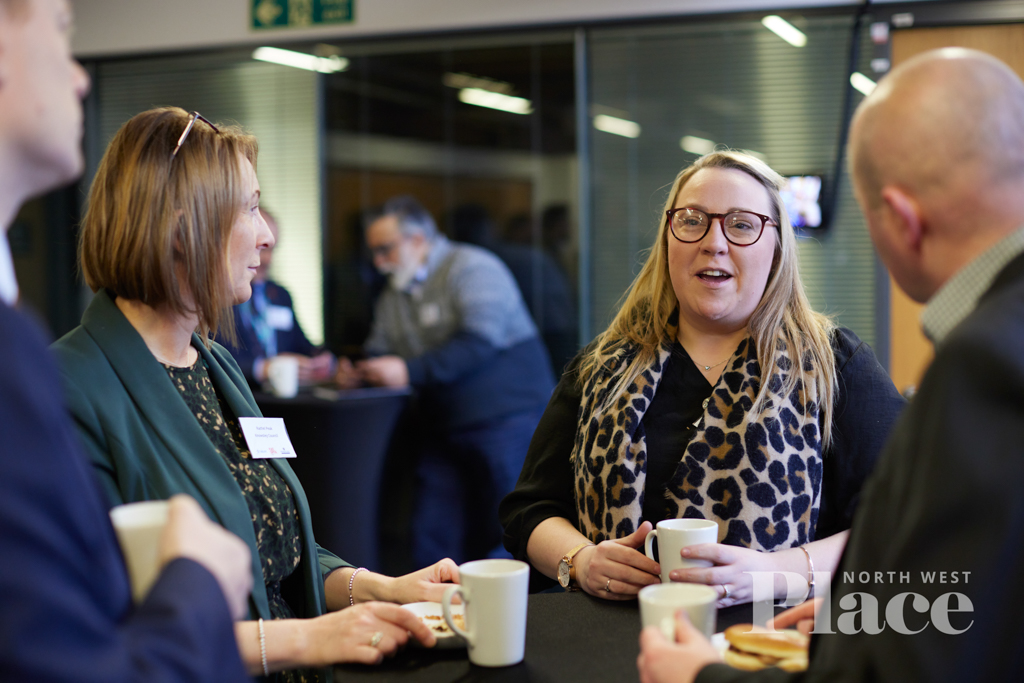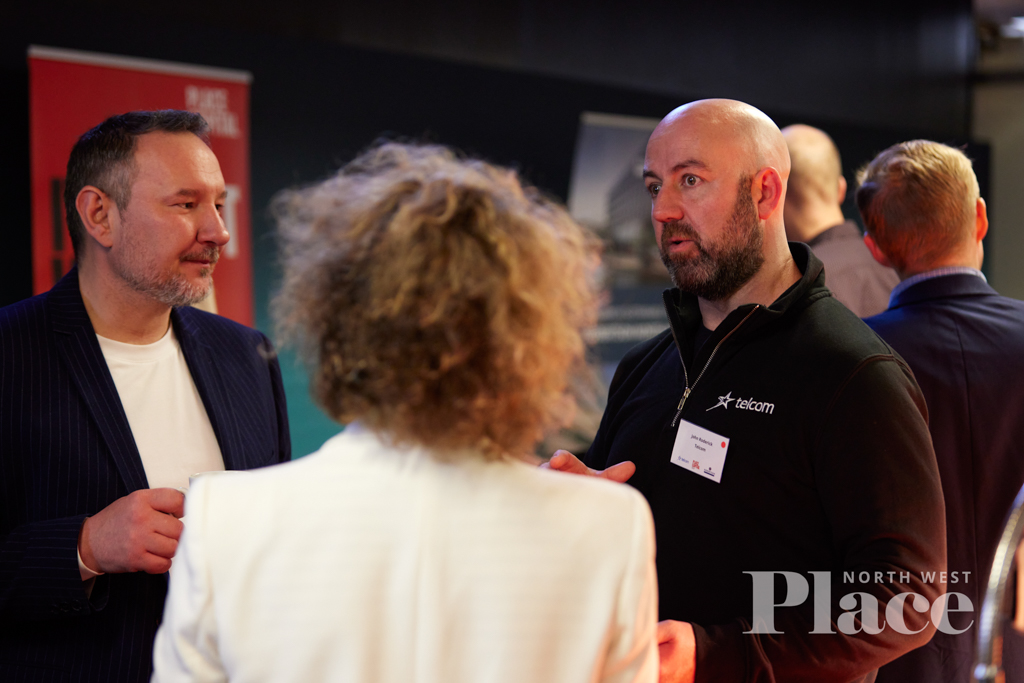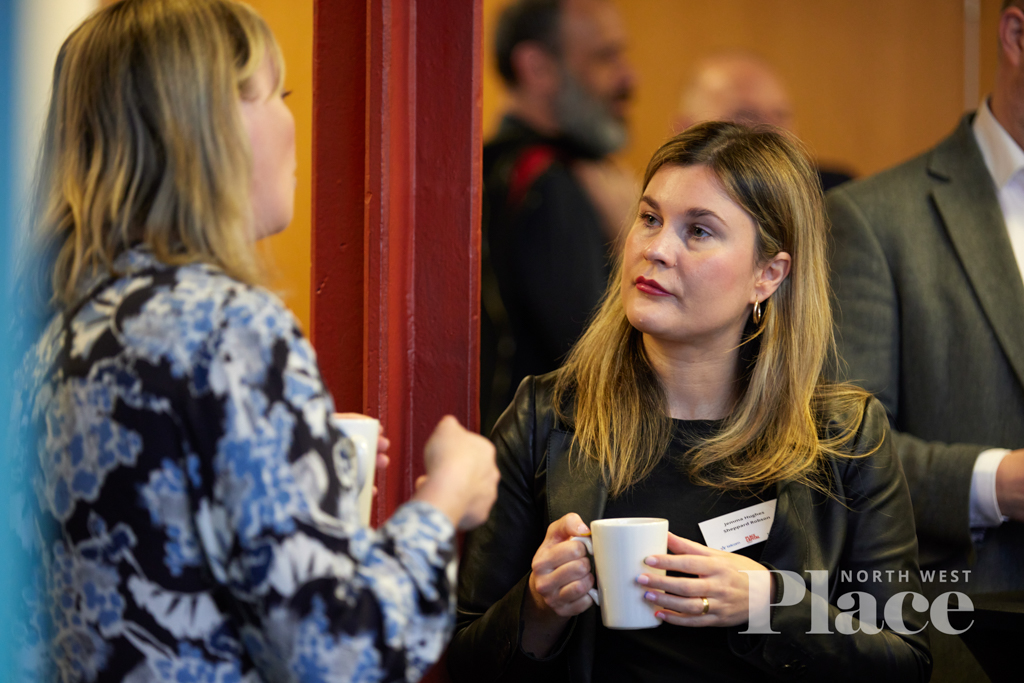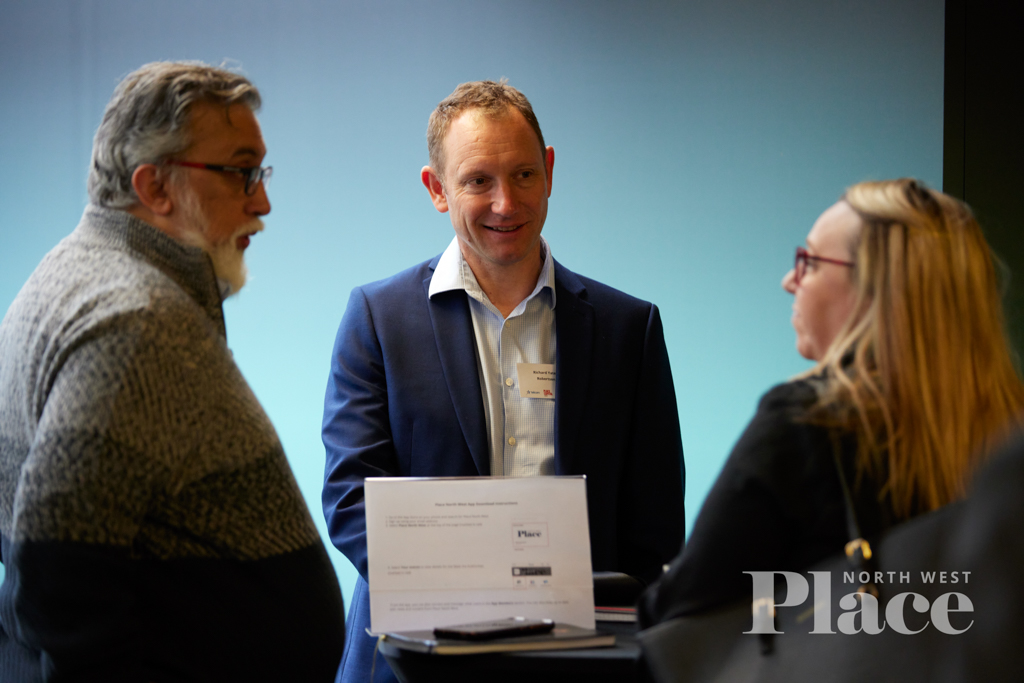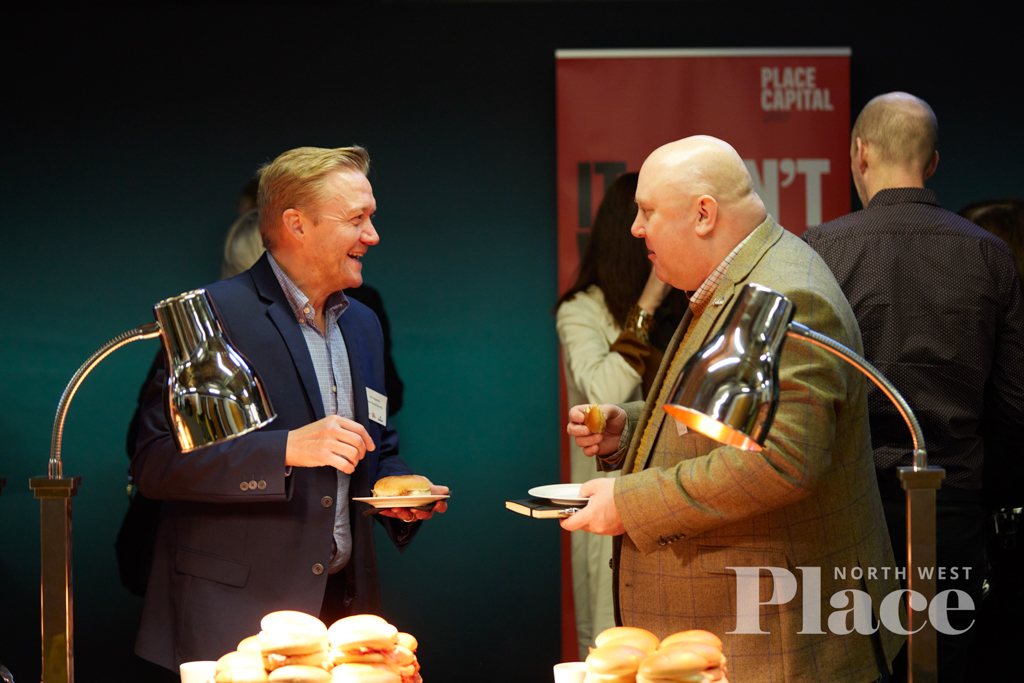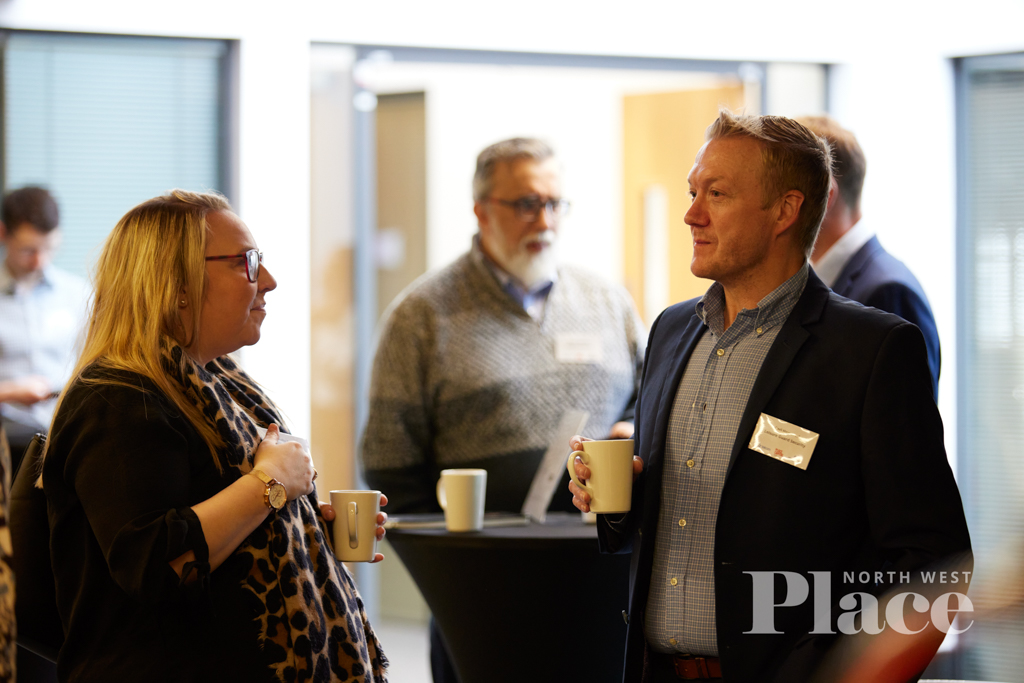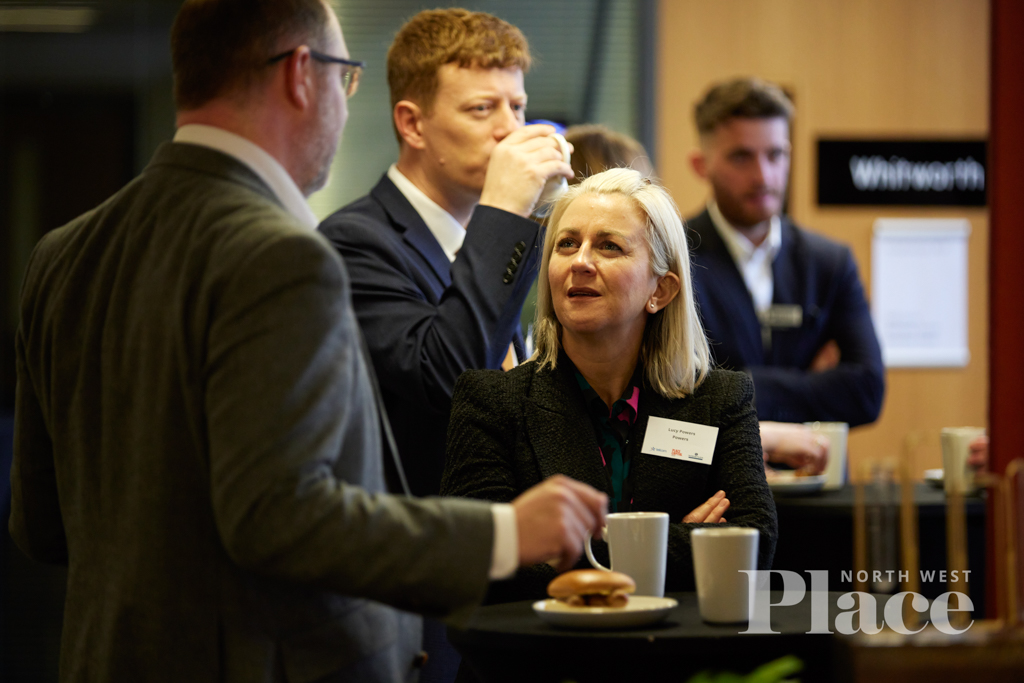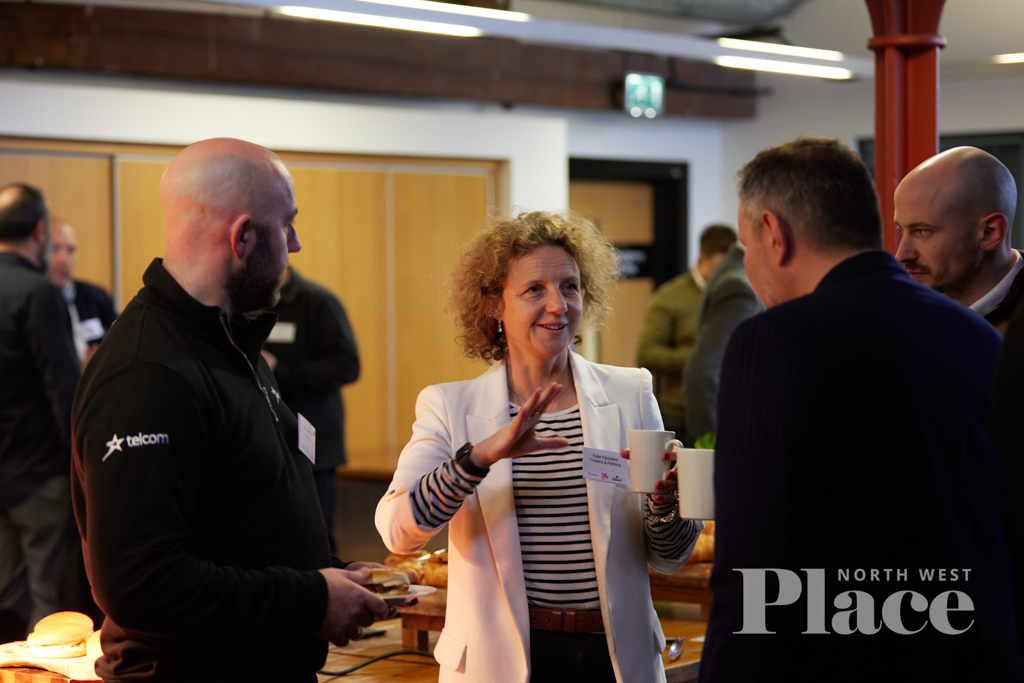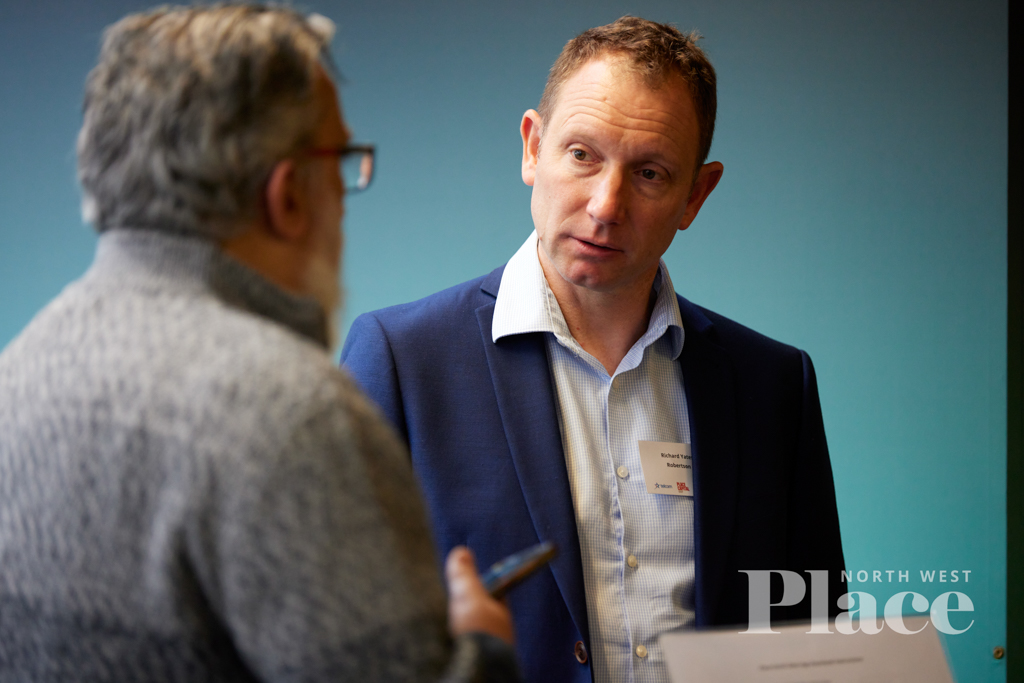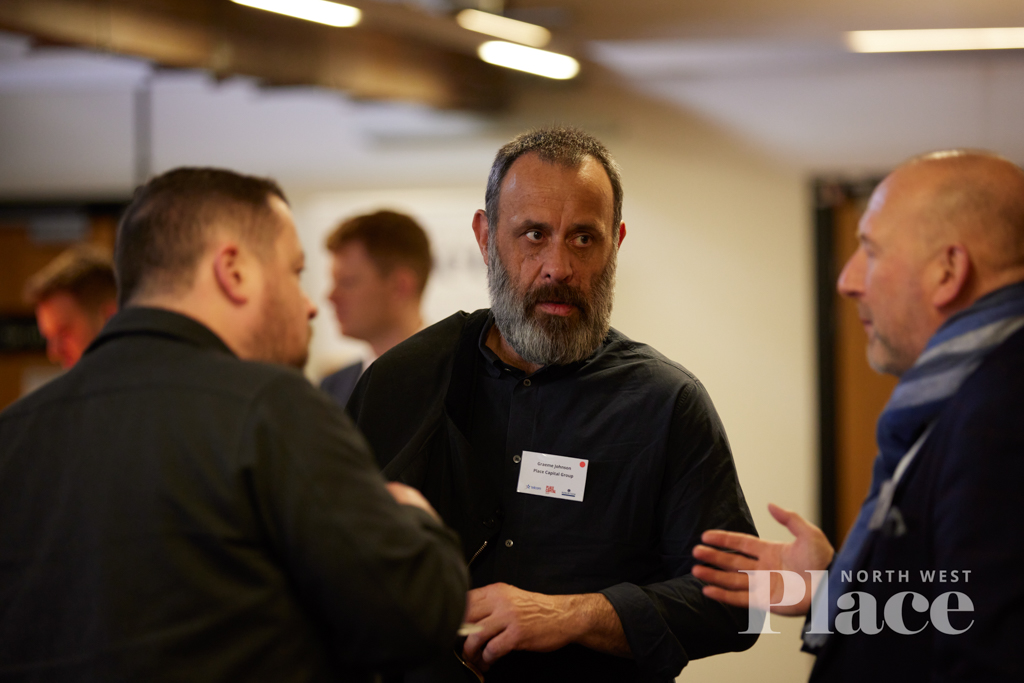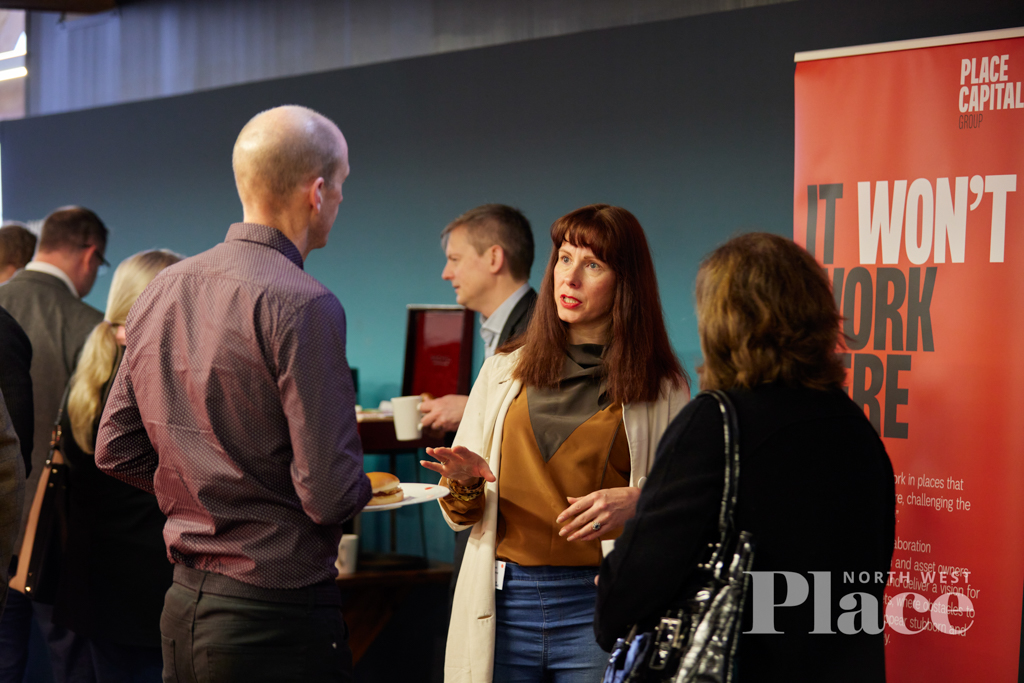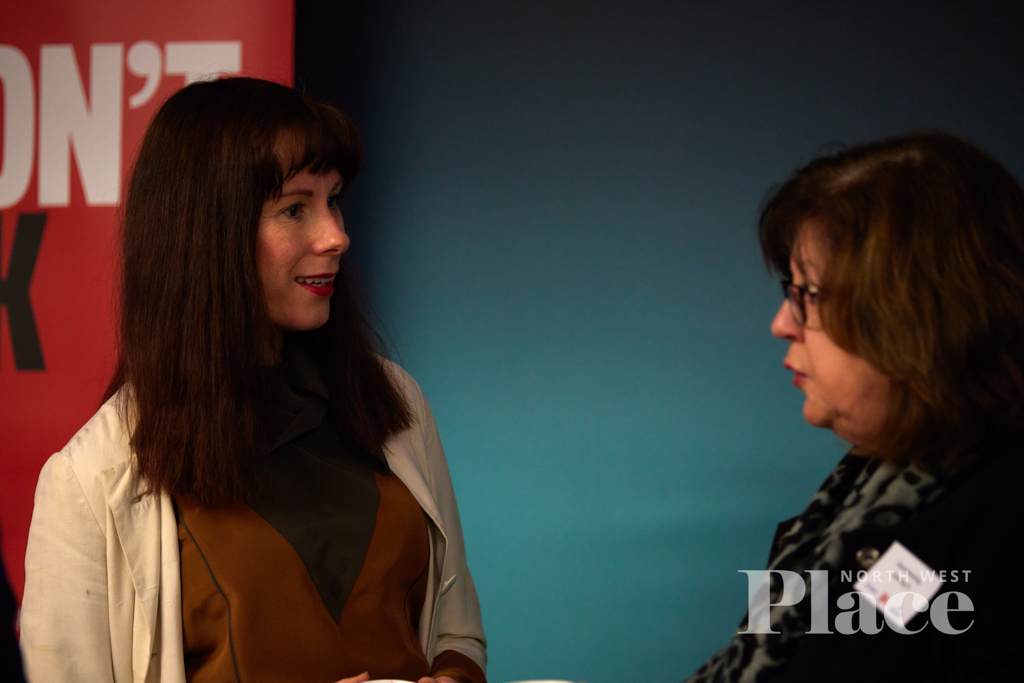Event Summary
Meet the Authorities: Photos and summary
Does collective vision make a great public-private partnership? What powerful outcomes can be achieved when public and private sectors work together? These were among questions answered at Meet the Authorities.
Meet the Authorities was sponsored by Telcom, Place Capital Group and Robertson.
Scroll down to see photos and slides from the event.
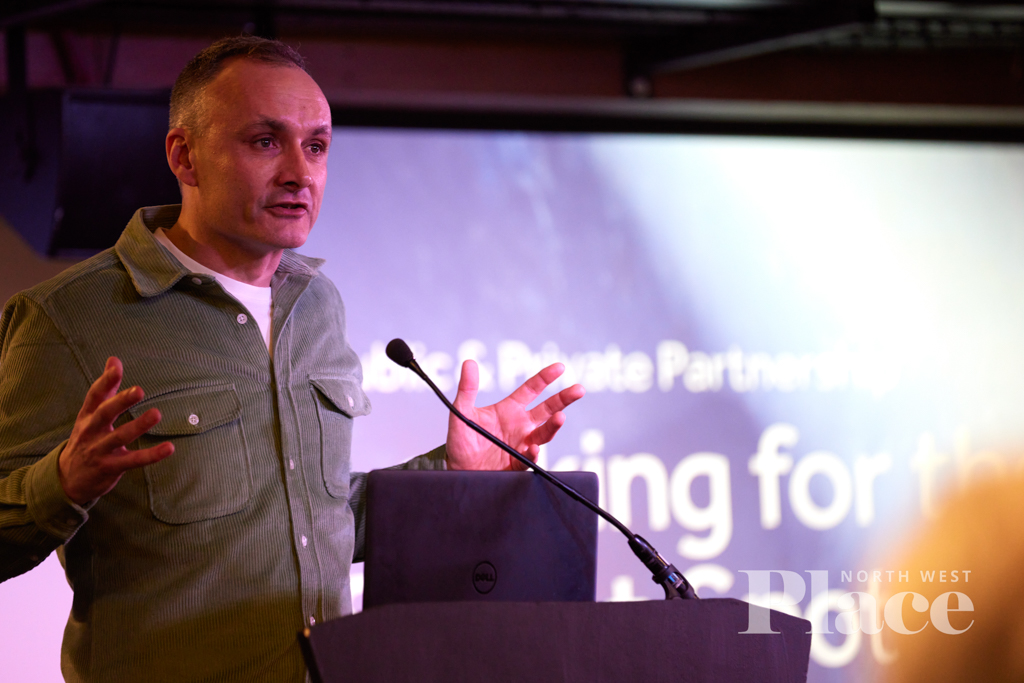
Place Capital Group’s David Smith-Milne delivered the first presentation of the event. Credit: PNW
‘Looking for the sweet spot’
That ‘sweet spot’ is the place where David Smith-Milne, founder of Place Capital Group, says investors, developers, public agencies and local authorities all ‘win’. He explained: “All of us have to remember
that most stakeholders are not the bank, they are not the developers – it’s the people that are impacted.”
And he had strong points to make about the trend of councils setting up wholly owned local housing companies, pointing out that 80% of local authorities now own them, while they have set-up costs of between £50m and £100m, and are only delivering 10,000 homes per annum in total – that’s an average of 37 per local authority.
He explained. “Councils are not calibrated to do all this stuff. They are not really organisations to deal with commercial risk. They set these vehicles up and continue to have political influence. Commercial critical management of the design process is missing.”
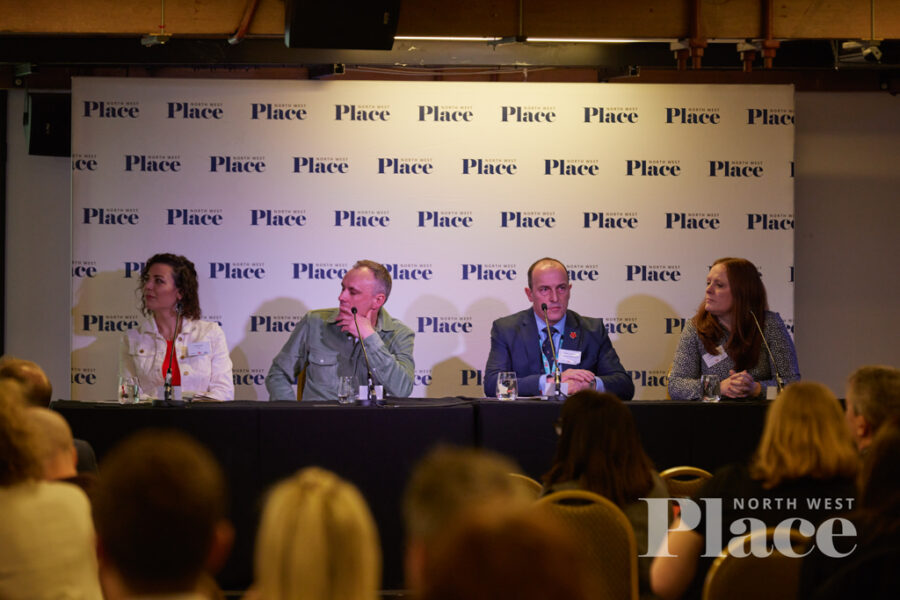
From left: U+I’s Laura Percy, Place Capital Group’s David Smith-Milne, Lancashire County Council’s Simon Lawrence, and Liverpool City Council’s Samantha Campbell. Credit: PNW
Thin red line
Smith-Milne also spoke of the importance of seeing beyond the developers’ red line of the development area – something which received the support of his fellow panel members in the first panel, all about maximising returns from public-private partnerships.
He described how new and old could sit cheek by jowl but if that red line wasn’t crossed, and adjoining places integrated better, it left people with the feeling “this could be so much more”.
Samantha Campbell, director of planning and building control at Liverpool City Council, agreed. She outlined a new public realm strategy that had been adopted and said: “We are trying to look beyond the red line. The strategy stitches the whole city together, not just the communities.”
Laura Percy, development director of regeneration specialist, U+I, updated delegates on progress at Mayfield, where Manchester has its first new public park within the city centre in 100 years. She explained how developments often receive their public realm last – something that wasn’t the case on this 6.5-acre site next to the Mancunian Way. Percy described how “patient capital aligned with partnership goals” to create green space first. This was aided by £20m from the government to pay for the park.
Unleashing private sector funding
Simon Lawrence, director of growth and regeneration at Lancashire County Council, suggested Eden Project Morecambe was the ‘classic example of how government investment was unleashing private sector funding’. He said the project partners were expecting additional investment of £100m to flow into the seaside town. Lawrence continued: “We need to secure clear governance to [manage] how that develops. It’s important to create foundations to go out and speak to investors. It’s got real potential and we need to unlock that.”
Place Capital’s Smith-Milne added: “Eden is a game changer but if we don’t get that right It could be a white elephant. We are committed to working with local authorities and interested in a culturally led development plan.”
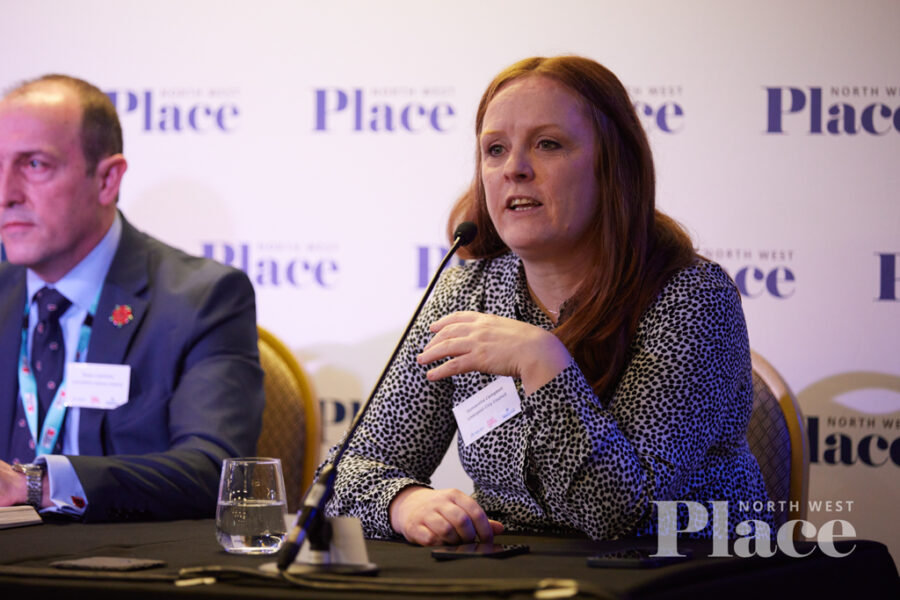
Liverpool City Council’s Samantha Campbell spoke about how the authority is investing its planning system. Credit: PNW
Partnerships and planning
Liverpool’s local authority turmoil has been well documented but Samantha Campbell said the council was on a “positive journey”, which was rebuilding confidence and issues were starting to stabilise. Speaking of several new senior appointments at the council, she added: “We are really galvanising the skill set in order to deliver.”
Dan Whelan, senior reporter of Place North West and event chair, asked if planning resources were to blame. Campbell said recruitment was a national issue and added: “We need talented young people to keep that freshness.”
Meanwhile, Smith-Milne took a different tack: “I’m more frustrated with developers. We need a tough planning system, we need a culture that makes my life harder.”
U+I’s Laura Percy highlighted the negative impact heavy governance and lengthy sign-off could have on a commercial partner, dampening their motivation and ability to crack on, adding that where private and public partners could speak with one voice, things were “much more agile”.
Quality or quantity?
Discussing volume housebuilders, Smith-Milne said: “We need legislation and a stronger structure that drives quality to make everyone come up with something decent. Come up with a product that people want to see.”
Percy said: “I completely agree. It’s people at the heart of that. What do communities want?”
Devolution deals
Lawrence said this was an interesting challenge and added: “You look outside Lancashire to see other authorities – Lancashire gets left behind. We need a grown-up conversation with Government about devolution.”
Campbell said having a strong leader does work: “It requires real collaboration, but a national figurehead gets that conversation going with central government.”
Percy added: “We can see how this has real impact. The ability to direct our own funds, the ability to start setting policy at this level, we have to see this as a positive step.”
Smith-Milne concluded: “It is cumbersome trying to do stuff in Lancashire. There are limited resources and navigating a way through is difficult. It could be better.”
Ongoing engagement
In the second presentation, Lauren Gavaghan, senior development manager at Bruntwood, said her company was looking for connectivity, collaboration, community and a sense of pride, striving for schemes with real impact in its public sector partnerships. And she said there were challenges – like the problem of retail monoculture, where town centres had lost their purpose, and with vibrancy and keeping communities engaged, as well as the issue of sustainability versus viability.
Gavaghan used Stretford Mall as an example of a great partnership. The 1970s shopping centre dissects the town but now it is being reimagined with a new square and central park, 700 homes, a reconfigured multi-storey car park, and proximity to a tram stop.
“It’s opening up the town centre, back to the people,” she said.
Gavaghan added that the scheme was creating space for independent businesses and supporting the evening economy, and that one vital aspect was keeping the town centre vibrant during the development. Bruntwood does that through ongoing engagement, using a ‘From Stretford With Love’ campaign to encourage locals to create a love letter to their town.
Rob Charnley, interim director of housing and economy at Cheshire West and Chester Council, agreed during the panel discussion: “There need to be lots of meanwhile uses and once it’s built you need to keep that flexibility going. Nice flashy visuals can be a noose you are hung by at a later date.”
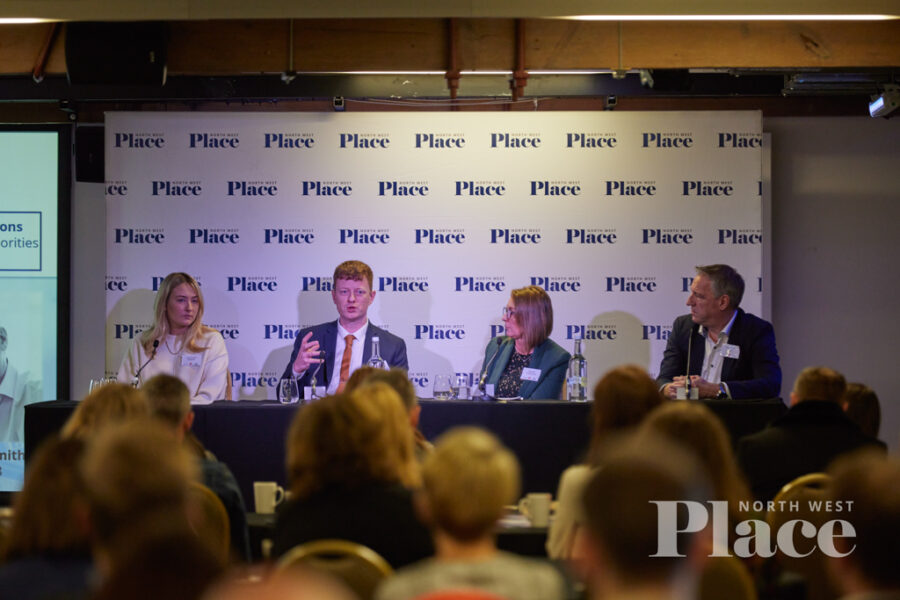
From left: Bruntwood’s Lauren Gavaghan, Cheshire West and Chester Council’s Rob Charnley, Knowsley Council’s Rachel Peak, and Genr8’s Warwick Smither. Credit: PNW
New ideas
The second panel discussion put town centre regeneration under the microscope, something which tied in nicely with Gavaghan’s example of the Stamford Quarter in Altrincham –described as an “unloved corner” close to the “really exceptional transformation around the market”. The area faced significant challenges with the closure of Debenhams and Rackhams, but now the properties are being reinvented as workspace and leisure use. It’s also a testbed for sustainability with as many materials being reused as possible, in addition to solar panels and a living wall packed with 36,000 plants. Other features include a cycle hub, pop-up shop, and a Not So Secret Garden social hub, food and record stand, to support entrepreneurial businesses.
Other panel members shared some of their favourite success stories. Warwick Smither, development director of Genr8, cited Rochdale, praising the amount of investment that has come into the town centre. He said: “There is a relatively small number of developments in this sector and it’s about differentiation. What we are wrestling with is viability, which is different to the cities. In Rochdale we have a very patient council to make it all happen. The council was bold.”
Knowsley’s future
Rachel Peak, regeneration programmes and assurance manager at Knowsley Council, said her authority has a “proactive open-door approach”.
“We are ready to talk to people,” she added.
It’s a busy time in the borough with Heritage Action Zone funding in Prescot – home to the new Shakespeare North Playhouse, where the council also purchased the shopping centre. In Huyton, the council is creating a mixed-use development. In Halewood, there’s £15m of levelling up work taking place.
Work life balance
Talk turned to Chester, a city under Charnley’s eye. “It feels like a place that’s thriving,” he said. “A scheme doesn’t stop as we finish one project. We need to get investors excited. We need to get residents back into the city centre, but we don’t want to bring in so many that it impacts life. It’s about balance.”
Smither added: “All our schemes have a residential component. That’s key in regeneration. But it needs to be blended with other uses – residential, commercial and the night-time economy. It’s got to be viable and that needs the public sector.”
Peak was keen to point out: “It’s not just nationals [businesses] – it’s regionals and independents as well. People want to shop on the high street more because they are rediscovering their local areas.”
A sense of identity
Gavaghan said in-depth research was vital so that places didn’t end up as “cookie-cutter towns.”
“Public consultation is not just a formal process. Sometimes you have got to look at the people and build around what they want.”
Smither stressed that every town is unique: “Chester has tourists. That’s not quite the same in Oldham or Rochdale. You have got to play to strengths. There is huge loyalty from communities – we have got to help them find the right answers.”
How can small players compete?
“We have procurement systems through The Chest,” said Peak, “and we have got to talk to lots of different people.”
Charnley highlighted that a lot of the big easy sites were well catered for by big developers and added: “We have got to be receptive to small developers to fix some of the other pieces. Some of that is about getting the offer right through the pre-application process. We have got to get smarter, so the information is out there. There are a lot of vacant units and small developers could be in there.”
Changing high streets
When asked if these key areas needed leisure use rather than shopping, Gavaghan said: “They have got to be lots of things, bringing people together for things you can’t buy on the internet.”
Peak said: “If you listen to the wants and needs of communities, leisure is in there.”
Charnley added: “How do you keep evolving? Young people will be the future users of the high street and if they don’t love it as a child, they won’t come back later. You must find uses to draw them in.”
Smither concluded: “Town centres are always in transition and you can’t legislate for that. Who anticipated the demise of the department store? Shopping is a pastime and part of the leisure experience. People want to shop, there will always be a place for it. It’s how it interfaces with leisure and other uses.”
Slides
David Smith-Milne, Place Capital Group
What’s next?
Want to be in the know on one of the hottest property sectors in recent years? Place North West’s North West Rental Market conference will be held on 4 May in Manchester and is perfect for those looking to learn vital market intel on build-to-rent, co-living, and more.
Click on any image to launch the gallery




